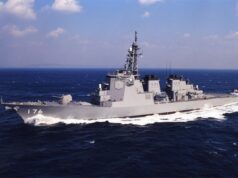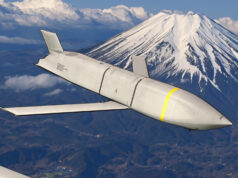In the wake of North Korea’s recent threat to attack United States forces in the Pacific, Forecast International expects the THAAD missile system to play a pivotal role.
This surface-to-air weapon system is currently deployed in South Korea.
“THAAD is a key element of the U.S. Ballistic Missile Defense System,” said Forecast International’s senior missile systems analyst Larry Dickerson. “It’s designed to shoot down short-, medium- and intermediate-range ballistic missiles – exactly the kind of weapons North Korea has in its inventory.”
According to its manufacturer, Lockheed Martin, THAAD has a 100 percent mission success rate in 13 consecutive flight tests since 2005, including 11-for-11 successful intercepts.
Following President Donald Trump’s remarks that North Korea will be met with “fire and fury like the world has never seen” if the country continues threatening the United States, North Korea said it is “carefully examining” plans for a missile strike on the U.S. Pacific territory of Guam.
“In response to earlier North Korean threats, the Pentagon previously deployed a THAAD missile battery to Guam, along with a TPY-2 radar system,” said Dickerson. “It seems that everywhere North Korea leader Kim Jong-un looks, a THAAD battery is staring back.”
Forecast International is providing a free detailed report on the THAAD missile. Find it at www.forecastinternational.com. The company is a major provider of ‘Market Intelligence and Consulting in the areas of aerospace, defence, power systems and military electronics’.








THAAD tests have all been short range and designed for success.
In a real engagement the chances of it being successful are 50/50.
And they can only intercept a missile in the terminal phase, they have no chance against a missile on its way up and then the missile is way too high for THAAD, Aegis and patriot until it starts coming down, so unless you have batteries everywhere there is loads of targets that could be hit.
These defence companies like to use words like “dome” and “shield” but in reality it’s very different, luring people into a false sense of security for sure.
Terminal phase you say!
They should give some clue to that…. perhaps in the name.
If they’re that successful then why don’t we look to procure them? Oh, money.
Saying that, we’re looking at missile defence on Type 45s anyway so it can’t be denied that we’re not against the principle of missile defence. The value of the ABM balance of power argument we’ve had with Russia over the years seems to be diminishing through the actions of other regional actors and are need to protect against them.
Agreed in testing THAAD has been used to intercept a single target at a known place and time. In the real world N Korea would launch several hundred rockets and missiles across the border with only 1 requiring the necessary war head.
Putin made the same point about Russia have 7k missiles there is no way THAAD could intercept all of them and if they plan to fire one they may as well go all in. I think the system is more about giving a false sense of security. I love how people made fun of dooms day preppers (and rightly so) yet many tech billionaires are constructing bunkers in new zealand.
Has there been any estimates as to the results of intercepting a nuclear tipped missile in its terminal phase? Haven’t heard a word about what that would actually result in for who and whatever is under its path, or indeed the atmosphere generally itself.
A battery has 48 interceptors.
The target get’s annihilated.
The interceptor is hit-to-kill….. so there has to be a direct impact for intercept to be successful.
Surely the points other commenters have been making, is the very same point the US has been using with regard to missile defence.
The US knows it cannot defend against a massive air attack, presumably that’s why they’re spending billions on rejuvenating their nuclear missile triad. What they want to neutralise is the small scale, singular attack which people like Iran and N. Korean can muster.
Surely current events are proving this very argument, which the US has been making for nearly a decade and which Russia has been rebutting for just as long. Perhaps now the Russian will finally accept that the US’s concerns regarding N. Korean were not only justified but accurate?